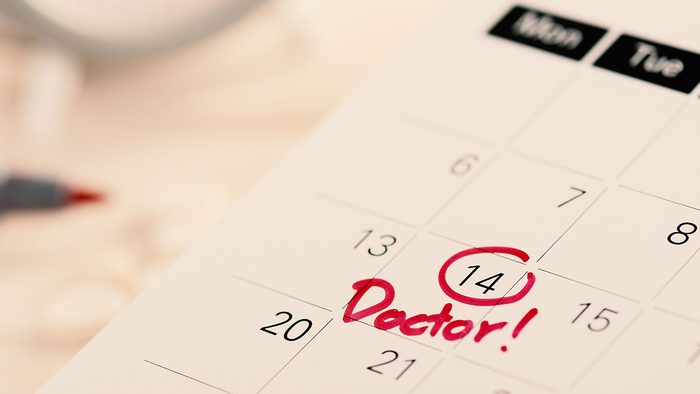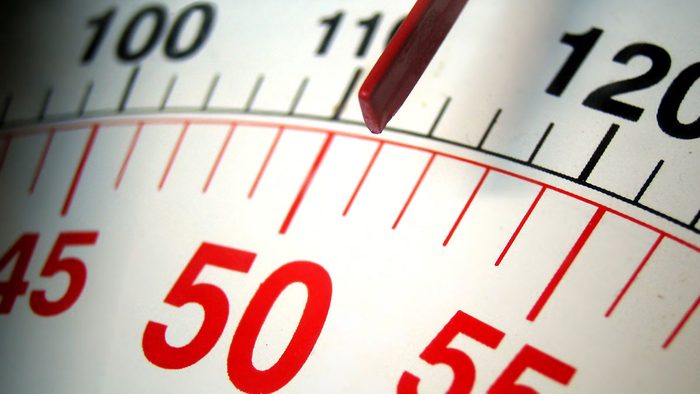
What your doctor is really thinking might shock you
A doctor’s time has always been a precious resource, so we need to make every minute count. But do we? To find out, Reader’s Digest interviewed doctors and compiled a list of their concerns. Then they commissioned a nationwide survey asking Canada’s doctors to give vent to their feelings and reveal what they’d really like to say to patients.
Here, we share the top 10 things your doctor wants you to know. Keep these tips in mind during your next appointment – and make sure you ask your doctor these questions!

1. “Be honest. If you’re not taking your medication as prescribed, tell me.”
Patients not taking their prescriptions? “It happens all the time,” says Dr. Armstrong Mettle of Saskatoon. Studies show that in Canada, 20 percent of prescriptions are never filled, and half of those that are filled are taken incorrectly.
Dr. Steve Chambers, a family physician and past president of the Alberta Medical Association, says: “Patients are sometimes afraid to tell doctors they have decided to follow another course of treatment or aren’t taking a prescription. They might have had a side effect and decided to go off it, and don’t want to hurt my feelings by telling me so.”
What you can do: Tell your doctor what you’re really doing. “To make sound decisions,” says Chambers, “the doctor needs as much information as you can provide.”
Related: Women in their 40s are falling through the cracks when it comes to anorexia. This is why.

2. “If you’re going to be late or miss an appointment, let my office staff know.”
GPs hate waiting for patients as much as patients hate waiting for them. “If you come in late, I’ll have less time for you, and chances are everybody after you will also have less time,” says one Vancouver-based family physician. It’s even more difficult when patients miss an appointment altogether. Another exasperated GP says: “After three no-shows, why shouldn’t I send you a bill? The dentist or the lawyer likely would have after the first time.”
What you can do: If you can’t make an appointment, cancel as early as possible.

3. “If you’re taking herbal supplements or over-the-counter drugs, or using alternative therapies, let me know.”
An Angus Reid poll in 2000 found that more than two thirds of Canadians take some form of nutritional supplement, including herbal products. “There is a public mind-set that if you’re taking a herbal preparation, it’s not an active pharmacological preparation,” says Dr. Mohamed Ravalia of Twillingate, Nfld. “So if you take a drug history and you don’t specifically allude to over-the-counter or herbal preparations, oftentimes the patient won’t volunteer it.”
What you can do: “If you’re taking alternative or complementary therapies, it’s important for your doctor to know that,” advises Chambers. Advise your doctor of any and all medications or supplements you are taking so that they have a more complete picture of your current health practices. You’ll want to be extra careful about mixing certain medications with exercise.

4. “You need to lose weight.”
More than three million Canadians are obese-enough to be termed an epidemic in a commentary in the Canadian Medical Association Journal. Dr. Mark Fromberg, a family physician in Kelowna, B.C., thinks most people look at obesity as a body-image issue and don’t realize it’s a precondition for about 35 different health problems, including cancer, heart disease, organ failure and depression.
What you can do: Admit that being overweight is a threat to your health and take steps to get your weight under control.

5. “Tell me what you’re worried about right away, not when you’re leaving.”
“You spend time with a patient on an ingrown toenail when the real problem is chest pain,” says Dr. Sharon Salloum, a family doctor and former associate dean of the Medical Undergraduate Program at the University of British Columbia. She understands why people often leave the worst for last: They’re nervous, apprehensive. “But if you’ve got something that’s really bugging you, get it out there [first] because it deserves the time.”
Doctors in the survey were divided about what to do when patients have several complaints. Salloum likes to hear the whole list and then prioritize: “We decide what we’re going to deal with today—typically the life-threatening one or the complicated one.” But another GP says, “One problem at a time!” (Don’t miss these subtle signs you might be a hypochondriac.)
What you can do: Ask your doctor how he or she prefers to work. If you bring in a list of problems, don’t expect your GP to deal with all of them in one visit.

6. “You don’t need a prescription.”
“It always happens — especially with antibiotics,” says Dr. Shelby Karpman, an Edmonton physician. “Patients have been trained through past history, through media, through friends, that if they walk out of a physician’s office without a prescription, they haven’t been treated properly. Quite frankly, there aren’t that many conditions that need antibiotic treatment. I have numerous patients who come in with cold or flu symptoms—for which antibiotics aren’t warranted—who insist they need an antibiotic. I take the time to explain that antibiotics don’t work for viruses, but a number then go to a walk-in clinic, where some of the physicians are less interested in patient education than in churning patients through. They write a prescription and the patient walks off thinking, Next time I have a cold I’ll come here, I won’t see Karpman.”
What you can do: Remember that nonmedical treatments often work as well as, or better than, pills. Try acupuncture for back pain.

7. “When you come to see me, be clear in your mind about your symptoms”
“I’m not a mind reader,” says one doctor. “Playing ‘stump the doctor’ is a waste of everyone’s time and is bad medicine for you.” Salloum suggests patients try to sort out the chronology of an illness before they come in. “When do you think it started? Is it getting better or worse? What makes it better? What makes it worse? Where is the pain? Does it radiate?”
What you can do: Be direct, concise, accurate—and prepared. Know when your symptoms started, how bad they are and how often they occur.

8. “Don’t expect me to renew a prescription over the phone. There may be a reason why I need to see you again.”
One doctor was blunt, saying, “I don’t get paid to provide telephone service.” Other GPs stressed the importance of a follow-up appointment to make sure a medication is working correctly. “A lot of patients say, ‘I feel fine, I don’t see why I should spend the time and effort to see the doctor just to get a prescription,'” says Dr. Jay Danforth of Edmonton. “But it’s not just to renew the prescription. It may just be five minutes to say, ‘Are you feeling okay?’ Or we’ll check your blood pressure if that’s what the problem is. We have to look at patients, how they walk in, the state they’re in and so on. There’s a lot more to an office interview than asking questions and receiving answers. You assess how they’re dressed, how they’re behaving. You do that instinctively. Patients don’t see that.”
What you can do: Make sure you understand how many times you can repeat the medication, and be understanding when your doctor won’t fill a prescription over the phone. Plus, there are some things your doctor can tell just by looking at you.

9. “Please wash before you come to see me.”
“I understand that sometimes a patient comes in from work,” says Fromberg. “But some are routinely dirty. I’ve had patients with an incontinence problem and they always smelled of urine. Frankly, I may not be giving them the time they need because I’m overwhelmed by the smell.”
What you can do: It may be tough to find the energy to look your best, especially when you’re not feeling well. However, basic hygiene is a must.
Fun fact: Doctors can actually detect these 12 diseases through smell.

10. “Don’t expect me to read dozens of articles you’ve downloaded from the Internet.”
Repeat after us: Wikipedia is not your doctor. “The Internet has more disinformation than information,” warns Danforth. “We had a pilot who argued with us over the fact that we wouldn’t let him fly, and who proceeded to bombard us with 1,500 pages of information he had downloaded from the Internet. Not one of the pages had solid scientific information based on peer-reviewed studies—but it did support his position.”
What you can do: Ask your physician to recommend some reliable sites. “If you want to know about diabetes, go to the Canadian Diabetes Association web site,” says Danforth. “The Heart and Stroke Foundation of Canada will tell you all about heart disease. Those kinds of web sites are useful.”
Next, be sure to make these 10 crucial health tweaks by the time you reach your 50s.
